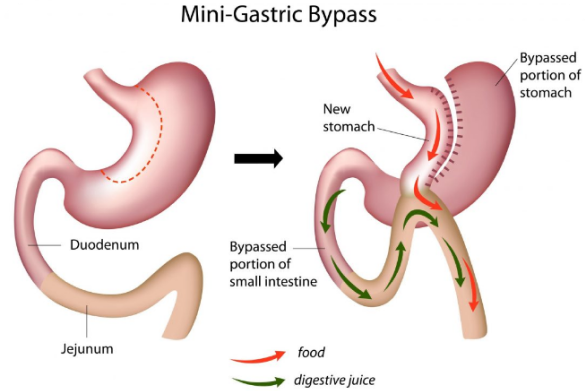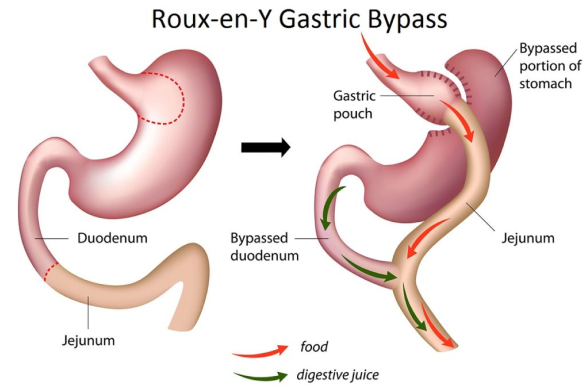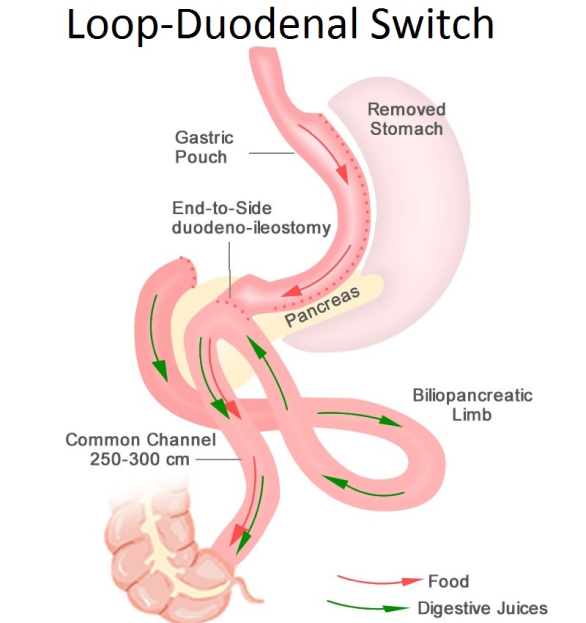
Our weight loss surgery expert explains gastric bypass surgery, including the different types and how they can lead to successful and sustainable weight loss.
What is gastric bypass surgery?
Gastric bypass is a type of bariatric surgery that usually results in fast and dramatic weight loss. A gastric bypass procedure works in two ways.
● It reduces the size of your stomach pouch so you can only eat smaller amounts of food.
● It modifies the path food takes through your digestive system.
This combination, along with hormonal changes that lower your appetite and help you feel full, usually leads to rapid weight loss and good long-term outcomes. On average people lose approximately 50-70% of their excess weight and experience improvement in weight-related health conditions.
What are the different types of gastric bypass surgery?
There are three types of gastric bypass surgery.
The laparoscopic mini bypass (single anastomosis)
This procedure firstly involves reducing the size of the stomach and connecting it further down the digestive pathway, bypassing about 150 cm of the small intestine.The bypassed section of stomach remains connected to the small intestine. It does not hold any food but can continue to make digestive juices.
It is also known as a single loop gastric bypass, mini gastric bypass, and omega loop gastric bypass.

The laparoscopic gastric bypass (Roux-en-Y procedure or dual anastomosis)
A Roux-en-Y procedure involves dividing the stomach into two sections. The upper section is formed into a very small pouch that receives food. The lower section is bypassed and no longer receives food. The small intestine is also divided. One part is connected to the stomach pouch. The other connects the bypassed section of stomach to the small bowel. This connection allows digestive juices and food to come together, enabling nutrient absorption. Following the procedure, food moves directly from the small stomach pouch to the small intestine without travelling through the lower part of the stomach, duodenum, and upper end of the small bowel (jejunum).

Single anastomosis duodeno-ileal bypass – with sleeve (SADI)
SADI is an updated keyhole weight loss procedure based on an older procedure known as a duodenal switch. It involves a two-step process. First, your surgeon will perform a sleeve gastrectomy, removing most of the stomach. Then they divide the top part of your small intestine (the duodenum) and bring a loop of intestine up and join it to this section of the duodenum.
SADI can be performed as a first weight loss surgery. It can also be performed as a revision bariatric procedureafter a gastric sleeve or lap band.

How long does gastric bypass surgery take?
A mini gastric bypass usually takes about 45 to 60 minutes to perform.
A Roux-en-Y bypass usually takes between two and four hours.
A SADI procedure usually takes about 90 to 120 minutes.
What are the benefits of gastric bypass surgery?
Gastric bypass surgery can lead to significant weight loss in a relatively short time. Gastric bypass procedures restrict both how much you can eat and affects absorption in the small intestine as well as hormonal changes. There are pros and cons to each type of gastric bypass surgery. Your surgeon can explain these to you in detail.
Benefits of sustained weight loss after gastric bypass surgery include:
- improvement in health conditions like type 2 diabetes, asthma, high blood pressure, arthritis, sleep apnoea and high cholesterol
- more energy
- improved fertility in women
- greater ease of movement and ability to do everyday things
What are the disadvantages of gastric bypass surgery?
Gastric bypass procedures are performed using a keyhole (laparoscopic) technique. They are considered safe for most people and serious complications are rare. All types of surgery involve risks, including pain, bleeding, infection, blood clot, or a bad reaction to the anaesthetic. Possible risks of gastric bypass surgery include:
- scarring / adhesions that creates bowel blockage
- inflammation of the stomach lining, stomach ulcers or gastric reflux (heartburn)
- injury to nearby organs
- leakage from staple lines / ulceration at anastomoses
- dumping syndrome – in which food moves too rapidly from the stomach to the intestines, causing symptoms such as stomach cramps and diarrhoea
- loose or more frequent bowel motions
- vitamin deficiencies.
A small percentage of people will not lose as much weight as expected or regain lost weight later.
Your weight loss surgeon will talk to you about possible complications and take every precaution to prevent them. They can help you explore the pros and cons of bariatric surgery and make an informed decision.
Is gastric bypass surgery right for me?
Gastric bypass surgery might be right for you if:
- your body mass index (BMI) is 35 or more
- your BMI is between 30 and 34.9 and you have one or more weight-related health problems (such as type 2 diabetes, sleep apnoea, or high blood pressure)
- you’ve tried other ways to lose weight (such as dieting, exercise and medications) and these haven’t worked
- you’re committed to making changes to your diet and lifestyle to support and maintain weight loss
- you’re healthy enough to have a general anaesthetic and surgery.
Your bariatric surgery expert can talk to you about whether you’re eligible for weight loss surgery.
How do I get a referral to a weight loss surgery expert?
If your GP (General Practitioner) thinks you could benefit from weight loss surgery, seeking advice from a bariatric surgery expert is the next step.
Our world-class surgeons offer advanced weight management procedures at various locations Australia wide. Ask your GP to refer you to one of our experienced specialists or doctors who perform bariatric surgery.
Your doctor can address the referral to a specific specialist or doctor, or simply to ‘Dear Doctor’.
How much does gastric bypass surgery cost?
The cost of gastric bypass surgery will depend on various factors. These include which procedure you have, what your surgeon, anaesthetist and hospital charges, and your level of health cover.
You can also choose to self-fund your surgery. Ask you surgeon for more information about costs and payment options.
How do I prepare for gastric bypass surgery?
Bariatric surgery is not a fast, easy fix for long-term weight management. Choosing to have gastric bypass surgery means committing to changing your diet and lifestyle. It’s a good idea to start making these changes in the weeks leading up to surgery.
Your surgeon may put you on a very low calorie diet (Optifast) before your procedure. This helps to shrink your liver, making the surgery easier to perform. Your weight loss surgeon or dietitian will explain this to you. You should also tell your surgeon about any medications or supplements you’re taking. If you’re taking blood thinners, you will need to stop these prior to surgery.
Here are some other ways to prepare for gastric bypass surgery.
|
What does recovery from gastric bypass surgery involve?
After surgery, most people stay in hospital for about two – three nights. You can go home once you are comfortable, able to walk, and able to drink enough liquid to keep you hydrated. Your stomach may be sore and swollen for several days. You can take paracetamol for pain, or your doctor might prescribe pain medications for a short period. You might also be prescribed medicines that reduce stomach acid.
The keyhole incisions will be covered with dressings. These are normally removed about 10 days after surgery. You will need to take it easy after surgery to avoid straining your wounds. It’s a good idea to have someone around who can help you with everyday tasks when you get home.
Your surgeon or dietitian will explain the diet you need to follow after gastric bypass surgery. You’ll be on liquid foods to begin with, gradually progressing to soft moist foods, then solid foods. You will feel full quickly and will only need small portions. Gastric bypass surgery reduces nutrient absorption, so you’ll need to take supplements for life.
You can usually start walking a few days after surgery. Most people can get back to their usual activities within two to four weeks. You will need at least a couple of weeks off work. Your surgeon will talk to you about returning to work and when to start exercising. You’ll have a follow-up appointment with your surgeon a few weeks after your operation and regular reviews after that.
FAQs about gastric bypass surgery
Can gastric bypass surgery be reversed?
This depends on which procedure you have. It is possible to return your stomach and small intestines to their original positions. However, this involves certain complications and risks. If part of your stomach was removed during the procedure, this cannot be reversed.
How much weight can I expect to lose?
On average, people who’ve had gastric bypass surgery lose about 60% of their excess weight. However, everyone is unique, and results vary from one person to another. You will start to lose weight rapidly after the procedure and can usually expect to continue losing weight for 12 to 18 months.
Can I get gastric bypass surgery?
You may be eligible to have gastric bypass surgery if your BMI is over 35, or over 30 if you have a weight-related health condition. You will need to be well enough to have surgery and committed to making dietary and lifestyle changes.
We’re a Centre of Excellence
 Norwest Private Hospital has achieved accreditation as a Center of Excellence in Metabolic & Bariatric Surgery from Surgical Review Corporation (SRC) 2021-2027.
Norwest Private Hospital has achieved accreditation as a Center of Excellence in Metabolic & Bariatric Surgery from Surgical Review Corporation (SRC) 2021-2027.
Norwest Private Hospital was evaluated based on rigorous and proven standards set by SRC. Accreditation requirements encompass physicians’ surgical expertise and experience, the standardisation of clinical pathways, consultative services, equipment and instruments, and patient education.
This accomplishment demonstrates Norwest Private Hospital’s commitment to delivering the highest standard of care and excellence to our patients.
Find out more about bariatric & weight loss surgery at Norwest Private Hospital
*Whilst effort is made to ensure that the information contained on this website is accurate and informative and it has been reviewed by a qualified medical practitioner, the information is general in nature, and it should not be used as a substitute for obtaining your own professional or medical advice. Any timeframes or quantitative data including but not limited to estimated timeframes for recovery following a procedure, time required for the procedure, timeframes for weight loss and/or estimated total weight loss are general in nature and your experience, outcomes and results may vary.
Do not use the information:
- to diagnose, treat, cure or prevent any disease;
- for therapeutic purposes; or
- as a substitute for the obtaining the specific advice of a health professional.
Healthscope Ltd and its related entities do not provide any guarantees, and assumes no legal liability or responsibility for the accuracy, currency or completeness of the information contained on this page or on our website, or for any injury, loss or damage caused by its use.
